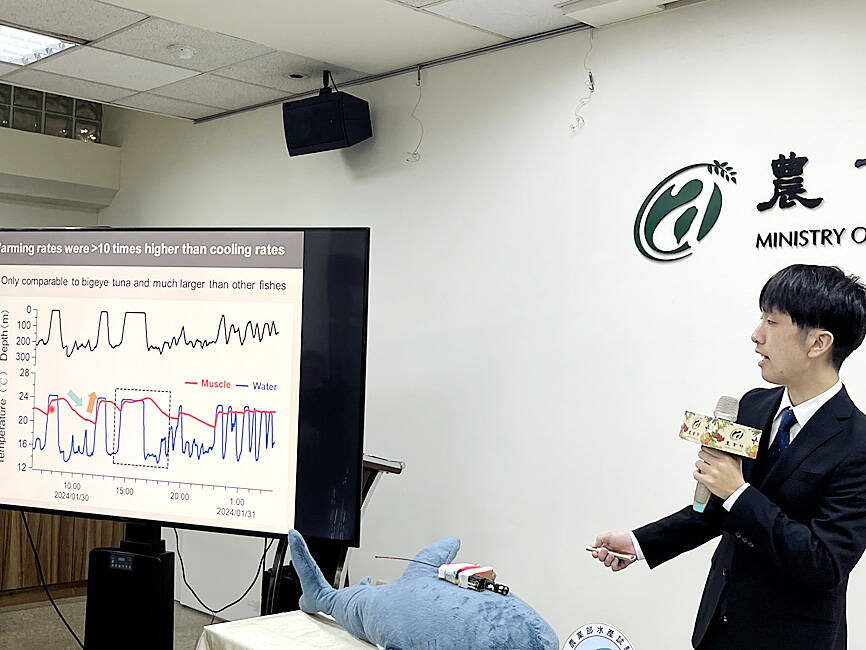Taiwan’s Fisheries Research Institute (FRI), in collaboration with local and Japanese universities, presented its findings on the behavioral characteristics and thermoregulation mechanisms of the shortfin mako shark on Monday.
The species of shark, classified as “endangered” by the International Union for Conservation of Nature, is one of the most common bycatches of Taiwanese commercial longline and gillnet fisheries, the FRI told a news conference.
The joint research was carried out by FRI in conjunction with Japan’s Graduate University for Advanced Studies (SOKENDAI) and National Kaohsiung University of Science and Technology.

Photo: CNA
According to SOKENDAI professor Yuki Watanabe, Taiwanese and Japanese fishers have helped to capture shortfin mako sharks and tag them with custom-made data loggers, which transmitted the data via satellite.
The loggers, which capture video recordings, monitored the sharks’ body temperatures and tracked their movements, SOKENDAI researcher Soma Tokunaga said.
Analysis of the data revealed the unique thermoregulation abilities of the shortfin mako that are not found in other shark species, one of which is the ability to regulate body temperature so that it stays warmer than the surrounding water, Tokunaga said.
When hunting prey even at depths of 1km where water temperatures are as low as 4°C to 5°C, the shark can use this ability to its advantage.
FRI Deputy Director-General Yeh Hsin-ming (葉信明) said the research also shows that the shortfin mako experiences only a slight decrease in body temperature averaging about 2°C to 4°C after each deep dive of several hundred meters.
This is vastly different to other types of shark, which typically keep themselves warm through a “countercurrent heat exchange,” where blood vessels transfer surrounding heat into the body, Yeh said.
The study found that during the day, the shortfin mako shark could be found in areas from the surface to depths of 300m and frequently crosses the thermocline, likely related to feeding behavior, FRI associate researcher Chiang Wei-chuan (江偉全) said.
At night, it prefers to inhabit depths of between 100m and 200m, Chiang added.
SOKENDAI is working on a report to publish the findings in international journals, Yeh said, adding that the research would also be presented at a scientific conference next month.
The research would serve as a useful resource for regional fisheries management organizations and others for research into the sustainability of the species, he said.
With climate change leading to variations in sea surface temperatures, the shortfin mako shark’s activity would also change, and as such, the findings could provide valuable insights for fisheries management, Tokunaga said.

TRAGEDY: An expert said that the incident was uncommon as the chance of a ground crew member being sucked into an IDF engine was ‘minuscule’ A master sergeant yesterday morning died after she was sucked into an engine during a routine inspection of a fighter jet at an air base in Taichung, the Air Force Command Headquarters said. The officer, surnamed Hu (胡), was conducting final landing checks at Ching Chuan Kang (清泉崗) Air Base when she was pulled into the jet’s engine for unknown reasons, the air force said in a news release. She was transported to a hospital for emergency treatment, but could not be revived, it said. The air force expressed its deepest sympathies over the incident, and vowed to work with authorities as they

Police have issued warnings against traveling to Cambodia or Thailand when others have paid for the travel fare in light of increasing cases of teenagers, middle-aged and elderly people being tricked into traveling to these countries and then being held for ransom. Recounting their ordeal, one victim on Monday said she was asked by a friend to visit Thailand and help set up a bank account there, for which they would be paid NT$70,000 to NT$100,000 (US$2,136 to US$3,051). The victim said she had not found it strange that her friend was not coming along on the trip, adding that when she

A tourist who was struck and injured by a train in a scenic area of New Taipei City’s Pingsi District (平溪) on Monday might be fined for trespassing on the tracks, the Railway Police Bureau said yesterday. The New Taipei City Fire Department said it received a call at 4:37pm on Monday about an incident in Shifen (十分), a tourist destination on the Pingsi Railway Line. After arriving on the scene, paramedics treated a woman in her 30s for a 3cm to 5cm laceration on her head, the department said. She was taken to a hospital in Keelung, it said. Surveillance footage from a

INFRASTRUCTURE: Work on the second segment, from Kaohsiung to Pingtung, is expected to begin in 2028 and be completed by 2039, the railway bureau said Planned high-speed rail (HSR) extensions would blanket Taiwan proper in four 90-minute commute blocs to facilitate regional economic and livelihood integration, Railway Bureau Deputy Director-General Yang Cheng-chun (楊正君) said in an interview published yesterday. A project to extend the high-speed rail from Zuoying Station in Kaohsiung to Pingtung County’s Lioukuaicuo Township (六塊厝) is the first part of the bureau’s greater plan to expand rail coverage, he told the Liberty Times (sister paper of the Taipei Times). The bureau’s long-term plan is to build a loop to circle Taiwan proper that would consist of four sections running from Taipei to Hualien, Hualien to